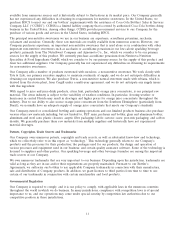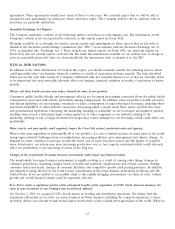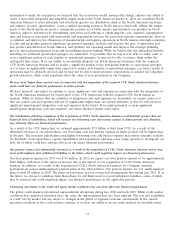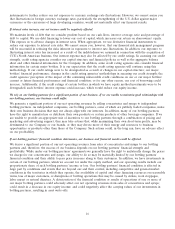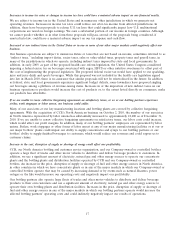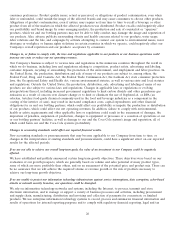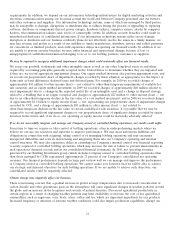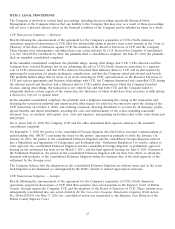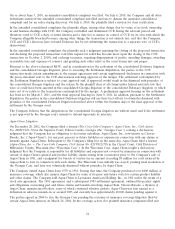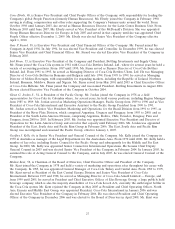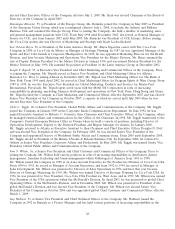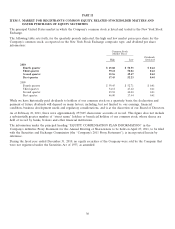Coca Cola 2010 Annual Report Download - page 22
Download and view the complete annual report
Please find page 22 of the 2010 Coca Cola annual report below. You can navigate through the pages in the report by either clicking on the pages listed below, or by using the keyword search tool below to find specific information within the annual report.consumer preferences. Product quality issues, actual or perceived, or allegations of product contamination, even when
false or unfounded, could tarnish the image of the affected brands and may cause consumers to choose other products.
Allegations of product contamination, even if untrue, may require us from time to time to recall a beverage or other
product from all of the markets in which the affected production was distributed. Product recalls could negatively affect
our profitability and brand image. In some emerging markets, the production and sale of counterfeit or ‘‘spurious’’
products, which we and our bottling partners may not be able to fully combat, may damage the image and reputation of
our products. Also, adverse publicity surrounding obesity and health concerns related to our products, water usage,
labor relations and the like, and campaigns by activists attempting to connect our system to environmental issues, water
shortages or workplace or human rights violations in certain countries in which we operate, could negatively affect our
Company’s overall reputation and our products’ acceptance by consumers.
Changes in, or failure to comply with, the laws and regulations applicable to our products or our business operations could
increase our costs or reduce our net operating revenues.
Our Company’s business is subject to various laws and regulations in the numerous countries throughout the world in
which we do business, including laws and regulations relating to competition, product safety, advertising and labeling,
container deposits, recycling or stewardship, the protection of the environment, and employment and labor practices. In
the United States, the production, distribution and sale of many of our products are subject to, among others, the
Federal Food, Drug, and Cosmetic Act, the Federal Trade Commission Act, the Lanham Act, state consumer protection
laws, the Occupational Safety and Health Act, various environmental statutes, as well as various state and local statutes
and regulations. Outside the United States, the production, distribution, sale, advertising and labeling of many of our
products are also subject to various laws and regulations. Changes in applicable laws or regulations or evolving
interpretations thereof, including increased government regulations to limit carbon dioxide and other greenhouse gas
emissions as a result of concern over climate change or to limit or eliminate the use of bisphenol-A, or BPA (an
odorless, tasteless food-grade chemical commonly used in the food and beverage industries as a component in the
coating of the interior of cans), may result in increased compliance costs, capital expenditures and other financial
obligations for us and our bottling partners, which could affect our profitability or impede the production or distribution
of our products, which could affect our net operating revenues. In addition, failure to comply with environmental,
health or safety requirements and other applicable laws or regulations could result in the assessment of damages, the
imposition of penalties, suspension of production, changes to equipment or processes or a cessation of operations at our
or our bottling partners’ facilities, as well as damage to our and the Coca-Cola system’s image and reputation, all of
which could harm our and the Coca-Cola system’s profitability.
Changes in accounting standards could affect our reported financial results.
New accounting standards or pronouncements that may become applicable to our Company from time to time, or
changes in the interpretation of existing standards and pronouncements, could have a significant effect on our reported
results for the affected periods.
If we are not able to achieve our overall long-term goals, the value of an investment in our Company could be negatively
affected.
We have established and publicly announced certain long-term growth objectives. These objectives were based on our
evaluation of our growth prospects, which are generally based on volume and sales potential of many product types,
some of which are more profitable than others, and on an assessment of the potential price and product mix. There can
be no assurance that we will achieve the required volume or revenue growth or the mix of products necessary to
achieve our long-term growth objectives.
If we are unable to protect our information technology infrastructure against service interruptions, data corruption, cyber-based
attacks or network security breaches, our operations could be disrupted.
We rely on information technology networks and systems, including the Internet, to process, transmit and store
electronic information, and to manage or support a variety of business processes and activities, including procurement
and supply chain, manufacturing, distribution and invoicing and collection of payments for concentrate or finished
products. We use enterprise information technology systems to record, process and summarize financial information and
results of operations for internal reporting purposes and to comply with regulatory financial reporting, legal and tax
20



